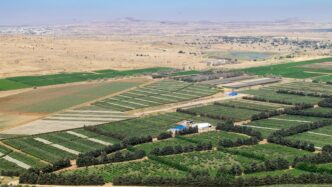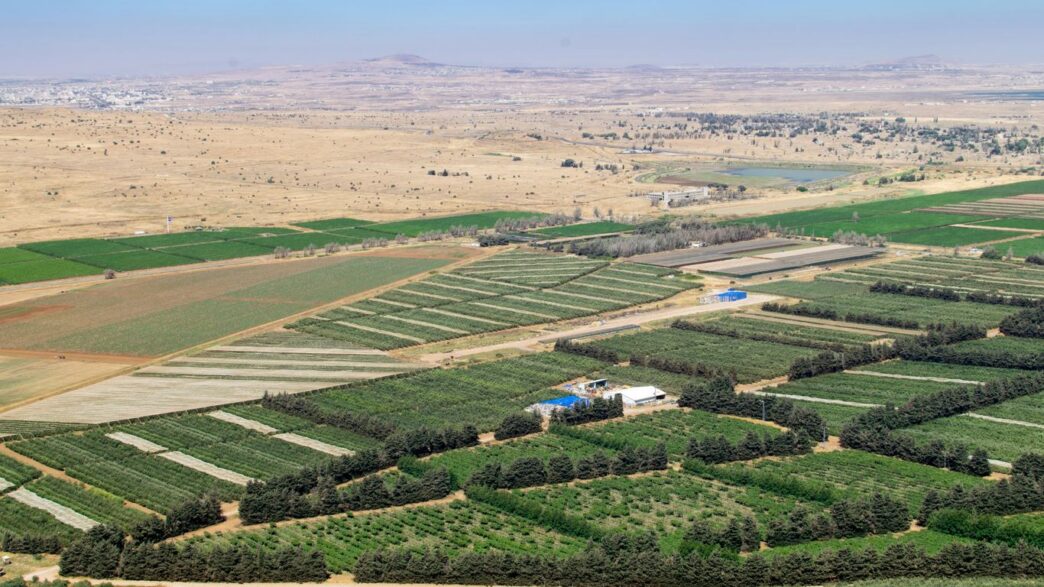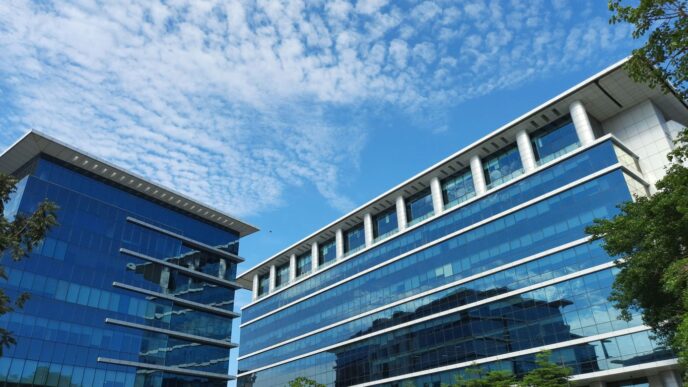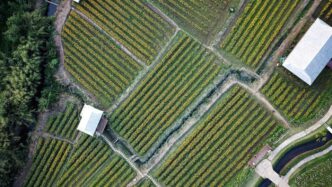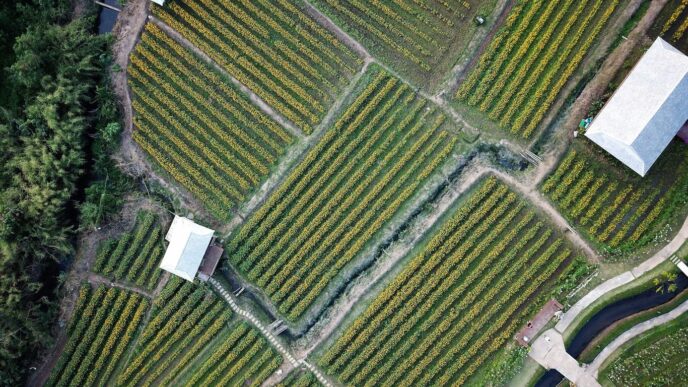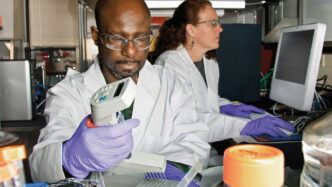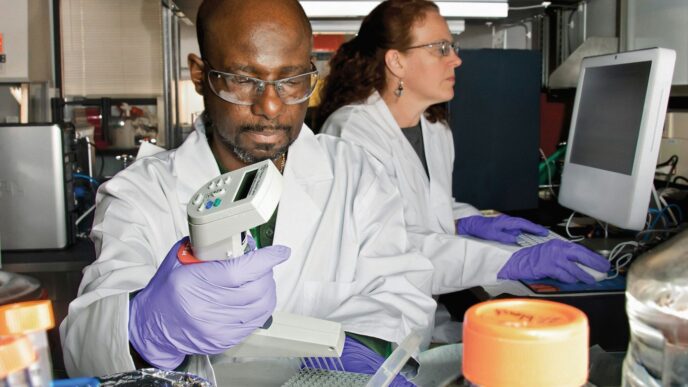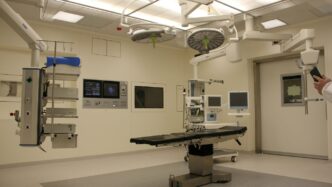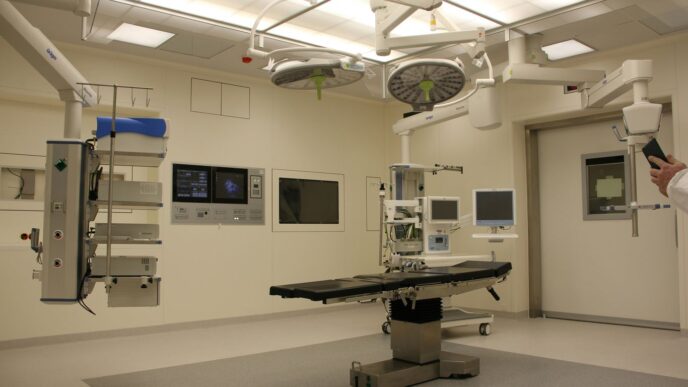Israel has become a real powerhouse when it comes to farming technology. Facing tough conditions like dry land and a need for more food, they’ve come up with some seriously smart ways to grow crops better. It’s not just about making more food, but also about using less water and making farming kinder to the planet. This agriculture technology Israel is developing is starting to make waves all over the world, helping other places grow more food too.
Key Takeaways
- Israel’s farming tech journey started early, focusing on getting the most out of the land.
- The kibbutz system helped a lot in trying out and using new farming ideas.
- Farms are using more high-tech tools now, even though farming isn’t as big a part of the economy.
- The government is stepping in to help expand farmland and support new farmers.
- Using advanced tech has made farming much more efficient, especially with water and managing crops.
Pioneering Precision Agriculture Through Technology
Farming used to be a lot about guesswork, right? You’d look at the sky, feel the soil, and just hope for the best. But Israel’s been changing that game big time with precision agriculture. It’s all about using smart tech to make farming more exact and, honestly, way more efficient. The goal is to give farmers the right information at the right time, so they can make better choices for their crops and their land.
Leveraging Data Analytics for Enhanced Crop Management
Think of it like this: instead of just looking at your crops, you’re getting a detailed report card for every single plant. Companies are developing systems that collect tons of data from the fields – things like soil moisture, nutrient levels, and even how much sunlight each area is getting. This information gets crunched by software, and farmers get clear advice on what to do. Should they water more here? Add fertilizer there? The data helps answer those questions.
Here’s a peek at what kind of data gets collected:
- Soil moisture levels
- Nutrient composition (like nitrogen, phosphorus, potassium)
- Temperature and humidity
- Light intensity
- Pest and disease indicators
This kind of detailed insight means farmers can stop wasting water and fertilizer on areas that don’t need it, and give more attention to where it’s actually required. It’s a smarter way to grow.
AI-Powered Insights for Optimized Farming
Artificial intelligence takes the data analytics a step further. Instead of just telling you what’s happening, AI can actually predict what will happen and suggest the best course of action. It learns from past seasons, weather patterns, and the specific conditions of your farm to make recommendations. For example, an AI system might predict a potential pest outbreak based on subtle changes in leaf temperature and humidity, allowing farmers to act before it becomes a big problem.
These systems can help with:
- Predicting yield
- Identifying optimal planting times
- Forecasting disease and pest risks
- Recommending specific crop varieties for certain conditions
It’s like having a super-smart farm advisor available 24/7, helping to fine-tune every aspect of the farming process.
Computer Vision for Real-Time Field Monitoring
Another cool piece of the puzzle is computer vision. This is where cameras and software work together to ‘see’ and interpret what’s happening in the field. Drones or even ground-based robots equipped with cameras can fly over fields and take high-resolution images. The software then analyzes these images to spot problems that might be hard for the human eye to catch. It can detect early signs of disease, identify weeds, or even assess the ripeness of fruit.
Computer vision is used for:
- Spotting nutrient deficiencies by looking at leaf color.
- Mapping weed infestations to target them precisely.
- Counting plants to check germination rates.
- Assessing crop health and growth stages.
This real-time monitoring means farmers can react quickly to issues, often before they spread and cause significant damage. It’s about catching problems early and keeping the crops healthy and productive.
Revolutionizing Water Management in Agriculture

Water is, as you know, pretty important for growing things. And in Israel, where it’s often dry, figuring out how to use water wisely has been a big deal for a long time. It’s not just about having enough water; it’s about using every drop as efficiently as possible.
Drip Irrigation Innovations for Water Conservation
Back in the day, watering fields meant flooding them, which wasted a ton of water. Then came drip irrigation, and Israel was right there at the front, especially with companies like Netafim. Instead of soaking the whole field, drip systems deliver water right to the plant’s roots, drop by drop. This means way less water evaporates or runs off. It’s like giving each plant a personal drink instead of a bath. This technology has been a game-changer, allowing farmers to grow more with significantly less water. Some systems can even deliver nutrients along with the water, making sure the plants get exactly what they need, when they need it.
Smart Sensors for Optimized Irrigation Schedules
Okay, so drip irrigation is great, but how do you know exactly when and how much to water? That’s where smart sensors come in. These little gadgets get buried in the soil and measure things like moisture levels, temperature, and even salinity. They send this information back to a central system, often using wireless tech. Farmers can then look at the data and decide the best time to water. It takes the guesswork out of it. Instead of watering on a schedule that might be too much or too little, you water based on what the soil and plants actually need. This can lead to some pretty impressive water savings – we’re talking up to 50% in some cases, according to companies like CropX. Plus, it helps prevent overwatering, which can lead to root rot and other problems.
AI-Driven Systems for Plant Stress Detection
Now, things get even smarter with Artificial Intelligence. AI can take all that sensor data, combine it with information from weather forecasts, satellite imagery, and even drone footage, and then figure out if plants are under stress. Stress can be caused by lack of water, too much water, or even nutrient deficiencies. AI systems can spot these issues early, sometimes before a human eye could even notice. They can predict potential problems and suggest specific actions. For example, an AI might notice that a certain section of the field is showing early signs of water stress and recommend a targeted irrigation adjustment for that area. This proactive approach helps farmers maintain healthier crops, increase yields, and reduce losses, all while continuing to be super efficient with water resources. It’s like having a really smart assistant who’s constantly watching over your fields.
Advancements in Robotics and Automation
Farming has always been tough work, and let’s be honest, finding people to do it can be a real headache these days. That’s where robots and smart machines are stepping in, changing how we grow food. It’s not just about replacing people, though; it’s about making the whole process smarter and more efficient.
Autonomous Harvesting Solutions
Harvesting is one of those jobs that takes a lot of hands and a lot of time. Companies are developing robots that can pick fruits and vegetables. These aren’t just clunky machines; they use cameras and sensors to figure out if a piece of fruit is ripe and ready to be picked. Some even have gentle grippers so they don’t bruise the produce. Think about robots that can carefully pick apples, peaches, or even delicate berries. This means less wasted food and a more consistent supply, even when human labor is hard to come by.
Robotic Systems for Labor Shortages
Beyond just picking, robots are being designed to handle other repetitive and difficult tasks. In greenhouses, for example, robots can help with things like pruning plants or moving them around. This is a big deal because greenhouses often need a lot of constant attention. By automating these jobs, farmers can keep their operations running smoothly without being completely dependent on finding enough workers, which is a growing problem.
AI-Enhanced Farming Equipment
It’s not just about robots doing the work themselves. AI is also being added to regular farming equipment to make it smarter. Imagine a tractor that can use AI to tell the difference between crops and weeds, so it only sprays herbicide exactly where it’s needed. Or equipment that can monitor soil conditions as it works. This kind of technology helps reduce the use of chemicals and water, making farming more sustainable and cost-effective. The goal is to create a partnership between humans and machines, where technology handles the repetitive tasks and provides data, allowing farmers to focus on the bigger picture and make better decisions.
Biotechnology’s Role in Sustainable Farming
Biotechnology is really changing the game when it comes to making farming more sustainable. It’s not just about tweaking existing methods; it’s about fundamentally rethinking how we grow food to be kinder to the planet. Think about developing crops that can handle tough conditions without needing as many resources. That’s where a lot of the exciting work is happening.
Developing Drought-Resistant Crop Traits
Water is a big deal, right? Especially in drier regions. Israeli scientists are using advanced biological techniques to create crop varieties that can survive and even thrive with less water. This isn’t just about making plants tougher; it’s about making agriculture possible in places where it was once a struggle. They’re looking at the plant’s natural abilities and finding ways to boost them, so less irrigation is needed. This means less strain on water supplies and more food produced with what we have.
Enhancing Pest Resistance Through Biological Solutions
Dealing with pests is a constant battle for farmers. Traditionally, this often meant heavy use of chemical pesticides, which can harm the environment and even our health. Biotechnology offers a different path. Companies are developing ways to make crops naturally more resistant to common pests. This can involve using beneficial insects or microbes that target specific pests without harming the crop or the wider ecosystem. The goal is to create a more balanced farming system where nature helps keep pests in check. It’s a smarter, more natural approach to crop protection.
Mycorrhizal Inoculants for Mainstream Agriculture
This is a bit more technical, but it’s pretty neat. Mycorrhizal fungi are tiny organisms that form a partnership with plant roots. They help plants absorb nutrients and water from the soil much more effectively. Israeli companies are figuring out how to produce these fungi in large quantities and in a way that farmers can easily use them, like a seed coating or soil additive. When farmers use these inoculants, their crops often need less fertilizer and water, and they tend to grow better. It’s like giving the plants a natural superpower to get what they need from the soil, making farming more efficient and less reliant on artificial inputs.
Controlled Environment Agriculture Innovations
When you think about farming, you probably picture wide-open fields, right? Well, things are changing, and Israel is at the forefront of a big shift towards growing food indoors. This is called Controlled Environment Agriculture, or CEA for short. It’s all about creating the perfect conditions for plants to grow, no matter what’s happening outside.
Optimizing Indoor Farming Conditions
Israeli companies are really good at figuring out exactly what plants need. They use a mix of sensors and smart systems to control things like light, temperature, and humidity. This means they can grow crops year-round, using less water and fewer pesticides. It’s like giving plants their own personal spa treatment, but for better yields. They’re not just growing lettuce either; they’re looking at all sorts of crops, making sure each one gets exactly what it needs to thrive.
Vertical Farming Solutions for High Yields
Vertical farming is a big part of CEA, and it’s pretty cool. Imagine stacking layers of crops on top of each other in a building. This way, you can grow a lot more food in a much smaller space. Israeli innovators have developed systems that make this super efficient. They’ve got solutions for growing things like tomatoes and cucumbers in these stacked farms, and they’re getting some seriously impressive harvests. It’s a smart way to grow food in cities or places where land is scarce.
Intelligent Climate Control Systems for Greenhouses
Even traditional greenhouses are getting a tech upgrade thanks to Israel. Companies are developing smart systems that manage the climate inside greenhouses with incredible precision. These systems can adjust ventilation, heating, and cooling automatically, based on real-time data. This not only saves energy but also makes sure the plants are always in the best possible environment. It’s about taking the guesswork out of farming and letting technology do the heavy lifting.
Here’s a quick look at what these systems can manage:
- Temperature: Keeping things just right, day and night.
- Humidity: Making sure the air isn’t too wet or too dry.
- CO2 Levels: Providing the right amount of carbon dioxide for plant growth.
- Light: Supplementing natural light or providing it entirely, at the optimal spectrum.
The Ecosystem of Agriculture Technology Israel
Cross-Sector Collaboration Driving Innovation
Israel’s agricultural technology scene isn’t just about individual brilliant ideas; it’s really about how everyone works together. Think of it like a big potluck dinner where everyone brings their best dish. You’ve got universities doing the deep research, startups coming up with wild new gadgets, and established companies figuring out how to make them work on a large scale. The government also plays a part, offering support and sometimes even setting up programs to get new ideas off the ground. This mix means that when a problem pops up, like needing to save more water or grow crops with less land, there are lots of different minds and resources ready to tackle it. It’s this constant back-and-forth between different groups that keeps things moving forward.
Rapid Iteration and Adaptability in AgTech
One thing you notice about Israeli AgTech is how quickly things change and improve. Because they’ve had to deal with tough conditions for so long – think arid land and limited water – they’ve gotten really good at finding solutions and then tweaking them until they’re just right. It’s not uncommon for a company to release a new version of their product every year, incorporating feedback from farmers and new discoveries. This constant refinement means the technology doesn’t just sit there; it gets better and better. This ability to adapt and quickly make improvements is a big reason why Israeli solutions are so effective in real-world farming.
Global Scalability of Israeli Solutions
What’s really interesting is that while these technologies are born out of Israel’s specific challenges, they often turn out to be useful all over the world. That drip irrigation system that saves water in the desert? Turns out it’s a lifesaver in places that get too much rain too. The AI that spots plant diseases? That works just as well in a field in California as it does in the Jordan Valley. Israeli companies are pretty good at taking what they’ve learned and making it work for different climates, different crops, and different farming setups. They’re not just creating tech for themselves; they’re building tools that can help farmers pretty much anywhere improve their yields and use resources more wisely.
Looking Ahead: Israel’s Continued Role in Feeding the World
So, what does all this mean for the future? Israel’s knack for innovation, born out of necessity, isn’t slowing down. They’ve shown the world how to grow more with less, especially when it comes to water. From smart irrigation to robots that can pick fruit, it’s pretty amazing stuff. As global food needs keep growing and the climate gets trickier, what Israel is doing with its ag-tech becomes even more important. It’s not just about making farms more efficient; it’s about finding real solutions to feed everyone, everywhere, in a way that doesn’t wreck the planet. Expect to see more of these Israeli ideas popping up around the globe, helping to make sure there’s enough food for all of us.
Frequently Asked Questions
What makes Israel so good at farming technology?
Israel is great at farming tech because they had to be! With not much water and tough land, they learned to be super smart about growing food. They invented cool ways to water plants with just a little water and use computers to help farms work better. It’s like they turned a challenge into a superpower for growing food.
How does technology help farmers grow more food?
Technology helps farmers in many ways. Think of it like giving farmers superpowers! Computers can tell them exactly when and how much to water or fertilize plants. Robots can help pick fruits, and special cameras can spot sick plants early. This means less waste and more healthy food grown.
What is ‘precision agriculture’?
Precision agriculture is like being a super-accurate farmer. Instead of watering the whole field the same way, precision agriculture uses technology to give each plant or small area exactly what it needs, when it needs it. This saves water and resources while helping plants grow their best.
How are robots used in farming?
Robots are starting to do some of the hard jobs on farms. Some robots can carefully pick ripe fruits, which is tricky work. Others can help plant seeds or spray just the right amount of protection for plants. This helps when there aren’t enough people to do all the jobs.
What is ‘controlled environment agriculture’?
This means growing plants indoors, like in special rooms or tall buildings, where everything can be controlled. It’s like having a perfect weather day all the time for the plants! This helps grow lots of food in small spaces, even in cities, and uses less water.
How does Israel’s farming tech help other countries?
Israel shares its smart farming ideas and technology with the rest of the world. Countries facing similar problems, like not having enough water or dealing with tough weather, can use these inventions to grow more food and feed their people. It’s about making sure everyone has enough to eat.

